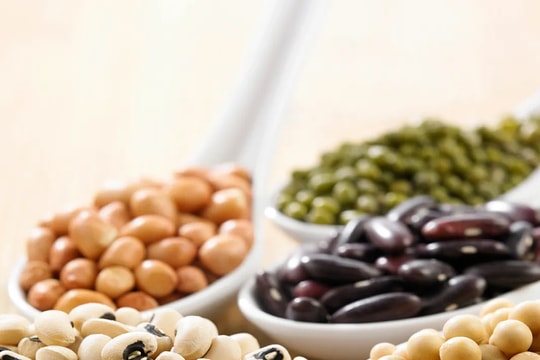Plant-based diets may reduce the risk of cancer and heart disease
Those studied also had a lower risk of ischemic heart disease and gastrointestinal and prostate cancers.
A new review of scientific literature has found that vegetarian and vegan diets improve cardiometabolic risk factors, such as elevated lipids, blood sugar, body weight, BMI, and inflammation.
Those studied also had a lower risk of ischemic heart disease and gastrointestinal and prostate cancers.
The authors of the study, published on May 15, 2024, in the journal PLOS ONE, further claim that vegetarians will reduce the risk of death from cardiovascular disease.
However, they note that pregnant vegetarians do not appear to have any difference in their risk of developing gestational diabetes and high blood pressure.

Previous studies have shown that diets low in plant foods and high in meat, refined grains, sugar and salt are associated with a higher risk of death, the authors write.
They say this suggests that eating more plants may have the opposite effect, reducing the risk of heart disease and cancer.
To see if this assumption was correct, the researchers examined 48 articles published over a 23-year period.
They selected articles that addressed plant-based diets and their effects on cardiovascular health and cancer risk; using a systematic review approach, they took data from all the studies and analyzed it. This approach is unique in that it only uses the highest level of evidence, which is other systematic reviews and meta-analyses.
When they analyzed two decades of combined data, they found that the association between vegetarian and vegan diets and reduced cardiometabolic risk factors was quite strong.
However, the research team admits that the study had some limitations, such as differences in the exact diets used, patient demographics, and study duration.
Why does a plant-based diet reduce health risks?
Dr. Libbat Shaham, a board-certified family physician with Manhattan Medical Offices and a LabFinder.com contributor who was not involved in the study, commented on the study, explaining that the observed health improvements may come from what plant-based diets lack: cholesterol and high saturated fat content.
“Cholesterol and saturated fat over time cause damage and blockage of blood vessels – the cause of heart attacks and strokes,” she explains.
Shaham goes on to say that saturated fats are found primarily in animal foods and are solid at room temperature.
“Cholesterol is made in the liver. Plants don’t have livers. Animals do,” she added.
Dr. Sarah Bonza, a board-certified physician specializing in family medicine and lifestyle medicine who was not involved in the study, added that plant-based diets may also help reduce the risk of chronic diseases because of what they contain, which are vitamins, antioxidants, and fiber.
“Fruits, vegetables, whole grains, legumes, nuts and seeds… all contain vitamins, minerals and phytonutrients that are beneficial to human health. With these eating plans, one can expect less inflammation and improved cardiovascular and immune health,” she said.
Bonza also points out that the fiber in plant foods helps speed up digestion and keep the gut microbiome healthy.
What is the best plant-based diet?
While the study looked at vegetarian and vegan diets, registered dietitian Faith Krisht, who was not involved in the study, advises that the best way to eat plant-based is to follow a flexitarian diet (also known as a semi-vegetarian diet).
“Research shows that vegan and vegetarian diets are often deficient in essential fatty acids such as EPA and DHA, Vitamin B12, Vitamin D and iodine, all of which are important nutrients for human health,” she says.
A flexible diet—focusing on eating mostly plant-based proteins, with occasional additions of animal proteins—helps ensure you get all the important nutrients you need.
Krisht also recommends eating a diet high in whole foods rather than one high in refined and ultra-processed foods.
“This means a diet rich in whole grains, beans, lentils, vegetables, fruits, nuts, seeds, and minimally processed animal proteins,” she says.
According to Krisht, this ensures you get plenty of healthy fiber and antioxidants while avoiding added sugars, which can increase your risk of chronic disease.

How to incorporate more plant-based foods into your diet
Krisht says an easy way to add more plant-based foods to your diet is to incorporate them into meals you love.
“Add black beans to the meat of a taco or quesadilla, add chickpeas to a curry, add some soy to a stir-fry, add pumpkin seeds to your morning oatmeal,” she suggests. You can start small and work your way up.
Krisht says one thing she likes to do is stock up on a variety of seeds, such as sesame, sunflower, chia, flax, hemp, and pumpkin.
These can easily be added to yogurt, smoothies, oatmeal, salads, baked goods, and even regular meals.
“You can also try adding different whole grains to your white rice like farro, quinoa, or wild rice,” she says.

Summary
More than 20 years of research has found that a plant-based diet can improve cardiometabolic health and help prevent cancer.
Experts say this is because plant foods are low in cholesterol and saturated fat while containing many other essential nutrients such as vitamins, antioxidants and fiber.
The best plant-based diet is one that is nutritionally complete by occasionally eating meat. It should also be rich in whole foods. To start eating more plant-based foods, start slowly and try incorporating them into your current diet.




